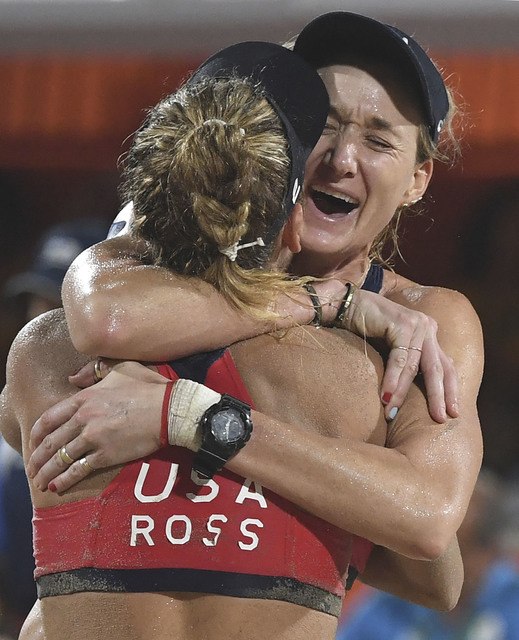RIO DE JANEIRO — In the heartbreak of the moment, Kerri Walsh Jennings couldn’t think any further ahead than the next evening. Asked after Tuesday’s semifinal loss if she could come back for another Olympics in 2020, she said, “I know I can. But I don’t know if I will.”
Walsh Jennings wanted to make sure she left the Rio Games with a bronze medal in beach volleyball, to go with the three golds she won in 2004, 2008 and 2012. She and partner April Ross got it done Wednesday, beating the Brazilian team of Larissa and Talita 2-1 at Beach Volleyball Arena on Rio’s Copacabana Beach.
The Americans were ragged in the first set, falling 21-17 as Brazil served up three aces. Walsh Jennings made some uncharacteristic mistakes, hitting one ball into the net, mishandling some serves and firing one of her own serves long.
Walsh Jennings and Ross won the second set when Larissa and Talita grew erratic. A 14-14 tie became a 15-14 lead when Walsh Jennings chased a ball all the way to the perimeter and kept it in play, the turning point of the match. The team gained a 19-15 lead on a Ross ace, and her big kill on set point gave the U.S. a 21-17 margin that evened the match. The U.S. won the third set 15-9.
Walsh Jennings won three Olympic gold medals with partner Misty May-Treanor, then teamed with Ross for her fourth Olympics. A 26-match win streak ended in the semifinals Tuesday. She said the bronze-medal match was the hardest she had played in her life.
“It was harder than I thought to get up for this match,” she said. “Our goal was to win our last match. It was a huge challenge and opportunity to come and fight for this. It is the highlight of my athletic career.”
Should she retire, Walsh Jennings could have found no better place to call it a career. She won her fourth Olympic medal playing on one of the world’s most beautiful beaches, in the soft, fine sand and sea air meant to surround the game.
Walsh Jennings played a major role in popularizing and legitimizing beach volleyball. People still come for the vibe, but that alone didn’t make the sport a surefire hit at every Olympics. Even in London, where she played in a cold drizzle on an artificial beach built next to the prime minister’s home, hordes of bundled-up spectators came to see her and May-Treanor win another gold.
The scene was much different on a balmy night in Rio. On one side of the stadium — a tall temporary structure built at the ocean’s edge — waves rolled up gently to meet the sand. On the other, Atlantica Avenue bustled, as it always does when Rio comes alive in the moonlight.
People gathered at sidewalk cafes surrounded by potted palms, drinking caipirinhas and beer. In the high-rise condos across the avenue, residents opened their curtains wide to peer at the crowds milling around the stadium. Some beachside bars had put TVs outside for patrons to watch the Olympics, and farther down the beach, tourists and locals strolled the promenade.
Even the stadium turned into a nightclub for the women’s medal matches, with swirling colored lights and a percussion band in the corner. The spectators weren’t in full party mode for the opening act; the stands were only about half full when the bronze-medal match began, but the stadium got progressively louder as it filled up.



